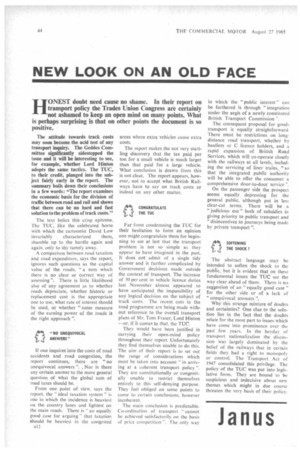NEW LOOK ON AN OLD FACE
Page 46

If you've noticed an error in this article please click here to report it so we can fix it.
HONEST doubt need cause no shame. In their report on transport policy the Trades Union Congress are certainly not ashamed to keep an open mind on many points. What is perhaps surprising is that on other points the document is so positive.
The attitude towards track costs may soon become the acid test of any transport inquiry. The Geddes Committee significantly sidestepped the issue and it will be interesting to see, for example, whether Lord Hinton adopts the same tactics. The TUC, to their credit, plunged into the subject fairly early in the report. The summary boils down their conclusions in a few words: "The report examines the economic basis for the division of traffic between road and rail and shows that there can be no hard and fast solution to the problem of track costs."
The text belies this crisp epitome. The TUC, like the celebrated horse with which the cartoonist David Low invariably characterized them, shamble up to the hurdle again and again, only to shy tamely away.
A comparison between road taxation and road expenditure, says the report, ignores such questions as the capital value of the roads, "a sum which there is no clear or correct way of assessing ". There is little likelihood also of any agreement as to whether roads depreciate, whether historic or replacement cost is the appropriate one to use, what rate of interest should be used, or whether "some measure of the earning power of the roads is the right approach ".
n"NO UNEQUIVOCAL ANSWERS" If one inquires into the costs of road accidents and road congestion, the report continues, there are "no unequivocal answers ". \ Nor is there any certain answer to the more general question of what the global sum of road taxes should be.
From one point of view, says the report. the " ideal taxation system " is one in which the incidence is heaviest on the country lanes and lightest on the main roads. There is "an equally good case for arguing" that taxation should be heaviest in the congested B12 areas where extra vehicles cause extra costs.
The report makes the not very startling discovery that the tax paid per ton for a small vehicle is much larger than that paid for a large vehicle. What conclusion is drawn from this is not clear. The report appears, however, not to accept what British Railways have to say on track costs or indeed on any other matter.
CONGRATULATE THE TUC
Far from condemning the TUC for their hesitation to form an opinion one might congratulate them for beginning to see at last that the transport problem is not so simple as they appear to have imagined in the past. It does not admit of a single tidy answer and is further complicated by Government decisions made outside the context of transport. The increase of 50 per cent in vehicle licence duties last November almost appeared to have anticipated the impossibility of any logical decision on the subject of track costs. The recent cuts in the road programme are being made without reference to the overall transport plans of Mr. Tom Fraser, Lord Hinton —or, if it comes to that, the TUC.
They would have been justified in carrying their open-mind policy throughout their report. Unfortunately they find themselves unable to do this. The aim of their report is to set out the range of considerations which must be taken into account "in arriving at a coherent transport policy ". They are constitutionally or congenitally unable to restrict themselves entirely to this self-denying purpose. They feel obliged on some points to come to certain conclusions, however incoherent.
The main conclusion is predictable.
Co-ordination. of transport cannot be achieved satisfactorily on the basis of price competition ". The only way
in which the "public interest" can be furthered is through "integration under the aegis of a newly constituted British Transport Commission ".
The consequent proposal for good, transport is equally straightforward. There must be restrictions on longdistance road transport, whether by hauliers or C licence holders, and a rapid expansion of British Road Services, which will co-operate closely with the railways at all levels, including the servicing of liner trains,_" so that the integrated public authority will be able to offer the consumer a comprehensive door-to-door service ''.
On the passenger side the prospect seems equally depressing for the general public, although put in less clear-cut terms. There will be a "judicious use" both of subsidies in giving priority to public transport and "disincentives to journeys being made by private transport ".
SOFTENING THE SHOCK ?
The abstract language may be intended to soften the shock to the public, but it is evident that on these fundamental issues the TUC see the way clear ahead of them. There is no suggestion of an" equally good case" for the other side or of a lack of "unequivocal answers ".
Why this strange mixture of doubts and certainties? One clue to the solution lies in the fact that the doubts relate for the most part to issues which have come into prominence over the past few years. In the heyday of transport nationalization the discussion was largely dominated by the belief of the railways that in certain fields they had a right to monopoly or control. The Transport Act of 1947 consolidated this privilege. The policy of the TUC was put into legislative form. They are bound to be suspicious and indecisive about new themes which might in due course threaten the very basis of their policy.
Janus












































































































